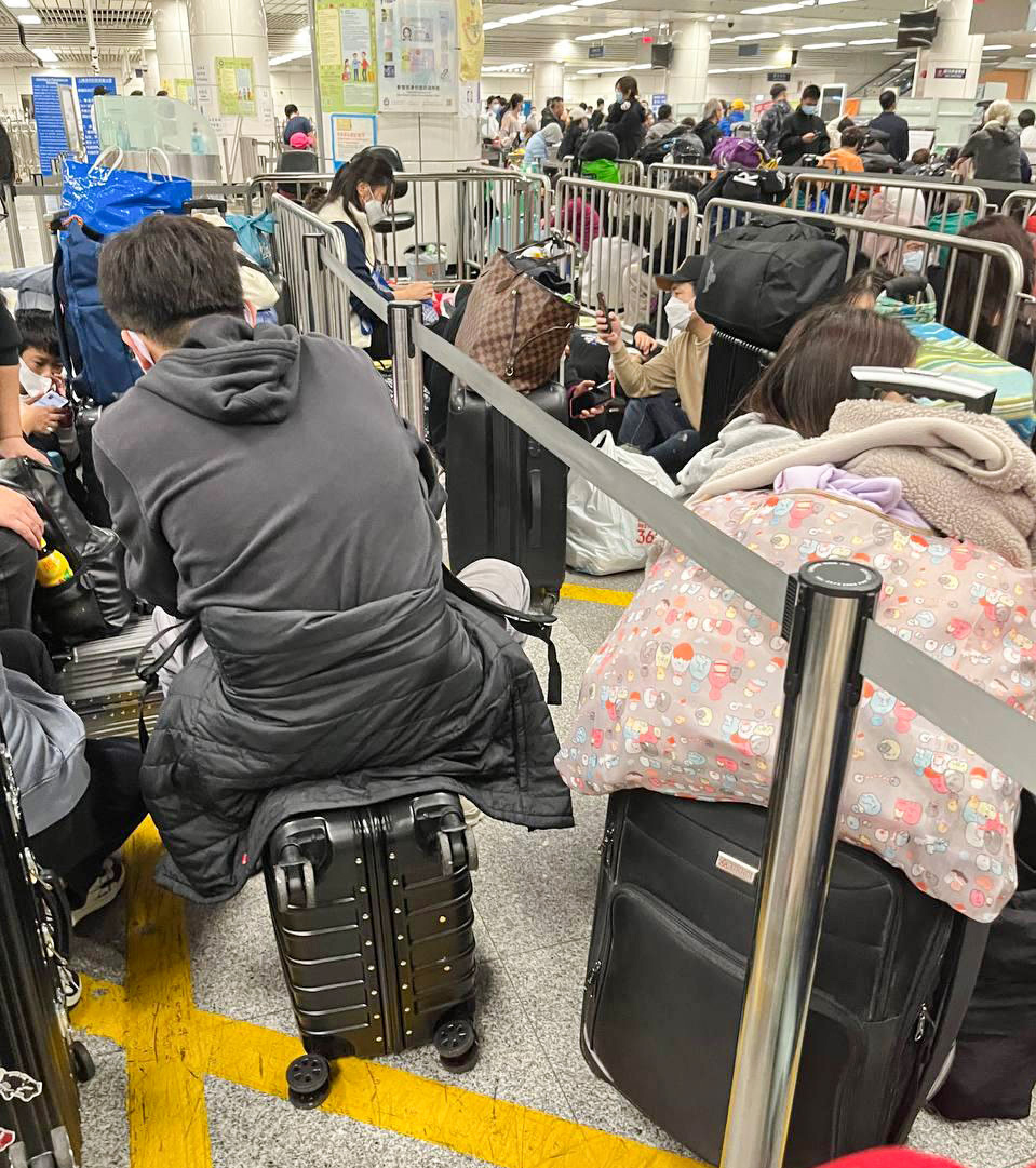
Coronavirus: Hong Kong residents swamp Shenzhen border crossing in search of protection from surging infections
- Families, elderly couples and even a few mainland students studying in the city wait hours to cross into Shenzhen in bid to escape the rising wave of infections
- Mother of two Elaine Chen was considering trying to cross and paying a scalper to secure one of the few hotel rooms available, until he raised his price
A line of roughly 600 residents was snaking around the immigration hall even before the checkpoint opened at 10am on Friday, with parents carrying young children, the elderly and people using wheelchairs among them.
Some of them said they became stuck in Hong Kong after the Lunar New Year holiday last week and needed to get back to work in Guangdong province, while others expressed hope of finding refuge in Shenzhen where no infections had recently been reported.

Hong Kong’s number of confirmed cases since the pandemic began more than two years ago reached 20,119 on Friday, and medical experts have forecast the fifth wave could last for several months.
The Post has learned that many of the residents waiting at the immigration hall slept overnight on Thursday hoping to successfully cross the next day even though they were unable to book a room at a designated hotel in Shenzhen, as required. They must also show a negative PCR test done within 24 hours of departure.
Among them was freelancer Esther Tan, who said she spent the night on the floor, without food, and would try to enter the mainland in the morning.
“We started queuing at 6pm [on Thursday] and finally exited the Hong Kong border at 2am. But we were told we could not enter Shenzhen because we did not have a hotel booking,” said Tan, 25, who was travelling with her partner.
She decided to try her luck after hearing rumours that some travellers without any hotel reservation were allowed to enter Shenzhen.
To avoid travellers camping out overnight, Hong Kong authorities on Friday began checking whether travellers had a hotel room reservation before allowing them to enter the departure hall.
The Shenzhen Bay border in northwestern New Territories is the more popular land crossing point that remained open to travellers. Statistics show nearly 15,000 people left Hong Kong through the checkpoint between February 1 and 10.
Only 500 people departed the city via the Hong Kong-Zhuhai-Macau Bridge during the same period. A public bus service was suspended in January but is scheduled to resume on Saturday.
New makeshift hospital on table, ‘hundreds’ of mainland lab staff in Hong Kong
The Hong Kong Federation of Trade Unions, a pro-establishment party, said it had received at least 100 queries from residents complaining about disrupted travel plans in the past two weeks, of which a third were about a shortage of hotels for quarantine.
The party called on the local government to liaise with mainland authorities to boost the supply over the border.
A check of availability found all hotel rooms in Shenzhen reserved until February 17. The high demand for hotel rooms sparked some scalpers to charge travellers hundreds of yuan for securing a booking.

Elaine Chen was tempted on Thursday morning to pay a scalper on social media who offered to help book a hotel room for a surcharge of 260 yuan (US$40).
The 27-year-old housewife wanted to bring her six-year-old daughter and 11-month-old son back to their Shenzhen home to reunite with her husband and avoid the children being infected in Hong Kong. But by Thursday evening, the scalper had raised the fee to 1,000 yuan and she declined to take up the offer, she said.
“I had mobilised my sister on the mainland and even used three devices but was still unable to get a room,” she said.
Even without the mandatory reservation, they were queuing among the crowds and hoping for the best.
‘No excuse to ignore us’, say Hongkongers waiting to be treated for Covid-19
Elderly travellers voiced frustration over a lack of assistance from authorities in navigating the technology required to meet the criteria and make the crossing.
One couple, both 72, said they were not aware they had to book a hotel before they could travel to the mainland. They were also unfamiliar with the national health code system and barely knew how to use a smartphone.
“We spent so much money getting a PCR test and taking a taxi to Shenzhen Bay, which cost almost HK$600 [US$77] for the both of us. But we didn’t know anything about QR codes, and we don’t have anyone who can help us,” said Mrs Tang, whose family are all based on the mainland. After an hour of queuing and being denied entry, the two decided to leave.

Some university students based on the mainland were also trying to return home after face-to-face classes were suspended.
Connie Chen, an engineering student at Polytechnic University, decided to head back to Shenzhen with her visiting father.
“The cost of living in Hong Kong is high. I am more comfortable at home, and I have friends and family back there,” the 22-year-old said.
University of Hong Kong student Wendy Li said that she was planning to stay with her relatives in Shenzhen. The switch to online classes and the relatively relaxed social restrictions over the border were the main reasons the 19-year-old was going back to the mainland.
“I don’t see a point in staying in Hong Kong,” she said.

